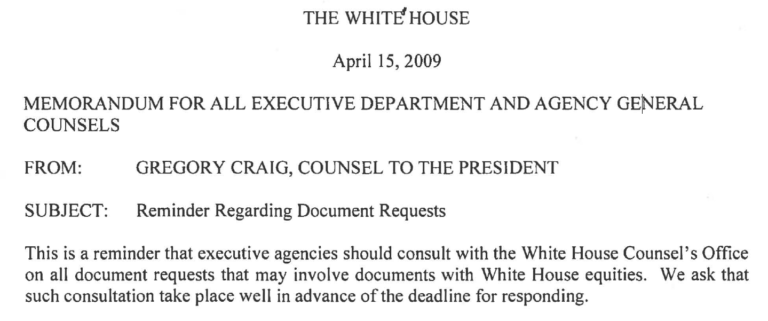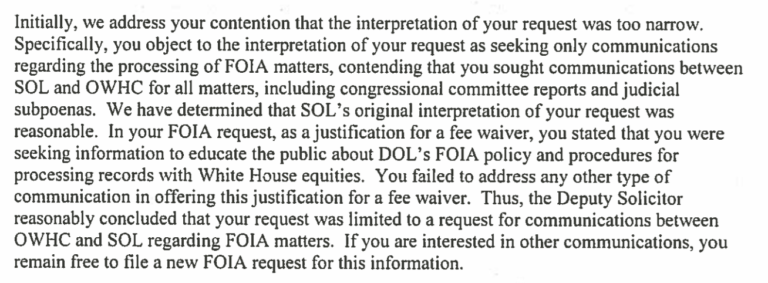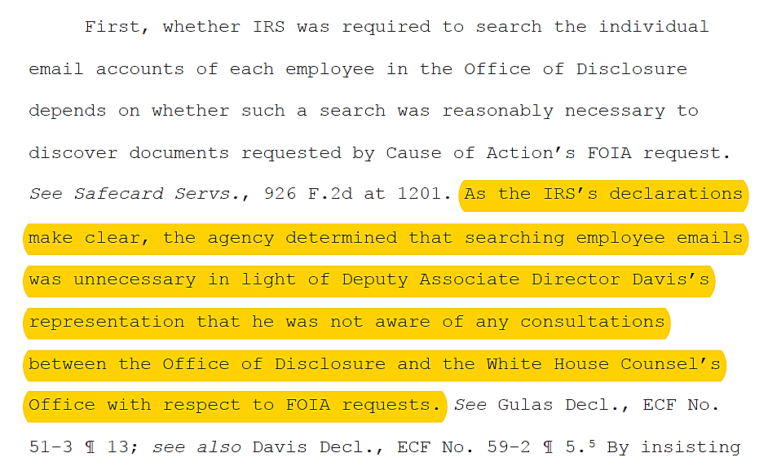The Department of Labor (“DOL”) recently denied CoA Institute’s long-pending Freedom of Information Act (“FOIA”) appeal concerning records of consultations between DOL and the Office of the White House Counsel (“OWHC”) on any documents containing “White House equities.” CoA Institute filed its request on November 26, 2013 and its appeal on September 25, 2014. After attempting to contact a responsible DOL official on over fifteen occasions, either through email or by voice message, CoA Institute finally asked the Office of Government Information Services (“OGIS”) to intervene in October 2017. Despite DOL’s promise to try to issue a determination this past March, its appeal decision only arrived last week—forty-five months after CoA Institute’s appeal was submitted and long past the applicable FOIA deadlines.
“White House equities” review and FOIA politicization
In March 2014, CoA Institute published a report revealing the existence of a non-public memorandum from then-White House Counsel Gregory Craig that directed department and agency general counsels to send to the White House for consultation all records involving “White House equities” when collected in response to any sort of document request. This secret memo stood in stark contrast to President Obama’s January 2009 directive on transparency, as well as Attorney General Holder’s March 2009 FOIA memo. Although originally praised as setting the bar for open government, the Washington Post eventually described the Obama Administration as one of the most secretive governments in American history.
As part of the system of politicized FOIA review established under the “White House equities” policy, whenever a requester sought access to records deemed politically sensitive, potentially embarrassing, or otherwise newsworthy, the agency processing the request would forward copies of those records to a White House attorney for pre-production review. Not only did the entire process represent an abdication of agency responsibility for the administration of the FOIA, but it severely delayed agency compliance with the FOIA’s deadlines. As we have previously suggested, “White House equities” review likely continues under the Trump Administration.
DOL’s deficient processing of CoA Institute’s FOIA request
In this case, CoA Institute’s request sought all records reflecting “White House equities” consultations. DOL released fifty-seven (57) pages of records with various pieces of information withheld under Exemptions 5 and 6, mostly personally identifying information—such as the names of lower-level DOL employees—or substantive portions of the agency’s conversations with White House attorneys. Interestingly, DOL never indicated which privileges it sought to apply with Exemption 5. (CoA Institute argued against the application of the attorney-client, attorney work product, and deliberative process privileges in its appeal.)
Most egregiously, DOL unilaterally limited the scope of its search to include only records reflecting White House review of FOIA requests, rather than the wide range of record requests covered by the Craig Memo:
DOL based its narrowing on stray language in CoA Institute’s request for a public interest fee waiver. But there is no authority to support an agency limiting the subject-matter scope of a FOIA request based on a fee waiver argument. A fee waiver request should only impact a requester’s obligations to pay any applicable fees.
DOL’s incorrect appeal decision . . . overdue by over three-and-an-half years
DOL’s appeal determination is troubling. The agency again chose to ignore the plain language of the Craig Memo, which was cited by CoA Institute and establishes the clear scope of “White House equities” review. Once more, DOL relied on CoA Institute’s fee waiver request. But that language simply cannot justify limiting a search to White House consultations on “FOIA requests.” As some type of consolation, DOL suggested that CoA Institute submit a new request.
After admitting that it had applied the deliberative process privilege, DOL summarily upheld its use of Exemption 5, describing the White House’s pre-production clearance of agency records to be part of DOL’s deliberative processes. DOL also refused to release the names of the lower-level employees who were involved in “White House equities” consultations, arguing that there was no public interest in the disclosure of their identities.
Concluding thoughts on OGIS and its lack of enforcement power
Congress created OGIS to help mediate disputes between requesters and agencies. OGIS is meant to provide an alternative to litigation. Yet OGIS lacks any sort of enforcement authority, and it can only intervene if an agency and the requester voluntarily submit to the mediation process. Thus, even if OGIS “resolves” a dispute, it has no power to hold the parties to their agreement. Agencies suffer no consequences for disregarding the outcome of OGIS mediation. This is a tremendous flaw in how OGIS is designed.
As this email chain demonstrates, CoA Institute asked OGIS to intervene in October 2017; OGIS closed its case in February 2018, following DOL’s commitment to trying to finish its adjudication of CoA Institute’s appeal by March 26, 2018. That date came and went.
This is not the first time OGIS mediation has proven ineffectual and an agency has refused to honor the promises it made as part of the dispute resolution process. CoA Institute is currently litigating another FOIA suit against the Department of Treasury over records reflecting the “sensitive review” process, which subjects certain FOIA requesters—such as representatives of the news media—to extra scrutiny. Treasury and CoA Institute agreed to a series of scheduled interim productions; Treasury missed every one of those deadlines, and it only began to release records once CoA Institute filed a lawsuit. This is an unacceptable practice, and Congress should look to reform the OGIS process.
Ryan Mulvey is Counsel at Cause of Action Institute





